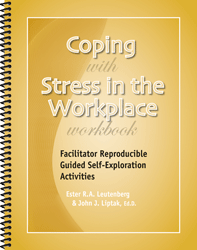Take this job and love it? Not how you’re feelin’ it?
In Coping with Stress in the Workplace we learn that too much stress in the workplace can interfere with productivity and motivation, can make employees dislike a job they once loved, and can impact an employee’s (and employer’s) mental, emotional and physical health. Even the perfect job has stressful deadlines and other seemingly unreasonable expectations.
Some of the outcomes of stress in the workplace include:
• Increased absenteeism
• Decreased productivity
• Increased health insurance claims
• Decreased motivation, energy among employees
• Heightened body reactions creating physical illness
• Increased unhealthy eating habits
• Increased concern about layoffs
• Increased poor cognitive decision making
• Increased job turnover among employees
• Increased family problems among employees
• Increased fear of effects of management changes
• Increased conflict among employees
• Worry about budget cuts
Stress is experienced in the workplace in three primary ways. Stress from one of these sources can be difficult to overcome, but stress from more than one can be debilitating.
Stress generated from within a person: Stress can be self-imposed through low self-esteem, anger, feelings of hopelessness, feelings of helplessness, anxiety, excessive negativity, the need to be in total control, perfectionistic tendencies, jealousy, and hostility.
Stress generated from the environment: Stress can be felt from the result of the work environment including overly demanding supervisors, low pay, poor working conditions, noisy work environments, too many commitments required for the work being done, long hours, lack of technology for employees to accomplish the work, lack of a safe place to work, whining co-workers, and complaining customers. Any of these external stressors can negatively affect the job performance of an employee. For example, a person who must work with an abrasive supervisor will feel uncomfortable most of the work day.
Stress from a poor job fit: Sometimes stress is felt by employees who do not have a good fit between their interests and skills and the demands of their jobs. Many people find that a good job fit is critical in being productive and being able to cope with stress. For example, a person who is not satisfied working a repetitive job may find a lot less stress in a job that is creative and flexible.
How do we get rid of stress in the workplace?
Kimberly Petrosino, Health Coach, Author and Heart Health Advocate has some suggestions to turn around the stress laden remarks we often get from co-workers when we return from a holiday. Her favorite holiday is Christmas…she loves it and everything that goes along with it. She asks:
Why is it that upon returning to the office after Christmas, my heart brimming with joy and love, I’m greeted with a chorus of “Thank goodness THAT’S over with.” “I’m exhausted.” “I’m broke.” “Now I have to go back to the stores and return everything.” WHAT? As a member of the cubicle community, I suggest we all reassess (our answers). Here are a few tips:
1. When someone asks you how your weekend was, instead of saying “Too fast, and now here we are again” just politely say “It was nice, and how was yours?”
2. Give people compliments every day! It may feel weird at first, but you’ll get used to it! When you make someone feel good, you’ll feel good too.
3. When you feel stress forming around you, take a moment to check in with yourself. Find your inner peace. Take a deep breath, and continue on. Don’t get caught up in the chaos around you.
4. Keep a special quote handy or post a keyword that always brings you back to center. I have the word “balance” written on a post-it and taped to the side of my computer monitor. If I feel the anxiety coming on, I look at it and remember to breathe and stay calm.
5. If your schedule permits it, don’t try to run all of your errands on your lunch break. Take a walk and get some fresh air. This is the time for a mid-day reset, not a race to see how many items you can cross off your to-do list in one hour.
Retrieved from the Huffington Post, April 4, 2016.
Great ideas for an easy fix. We need to hone our coping skills so that job stress becomes manageable. As authors Leutenberg and Liptak suggest in Coping with Stress in the Workplace, journaling can help. If you are stress-prone and a situation has made you feel upset or angry, try this:
Describe the situation that caused you stress.
Write abut what feelings you experienced? Anger, anxiety, disappointment, frustration, rage, stress, or something else. Take a couple of deep breaths. Practice breathing in through your nose and letting your breath out through your mouth.
From your past , recall and re-experience a positive event and the feelings associated with it.
Think and write about this positive event.
What feelings did you have during that positive experience? Love, devotion, compassion, exhilaration, patience, acceptance, appreciation, kindness, or something else.
Concentrate on those good feelings instead of the negative feelings you were experiencing. Bring them to mind when something stressful occurs at work.
Keep checking our blog. More stress coping skills for the workplace is coming soon.
Need a resource about Workplace Stress? Try Coping with Stress in the Workplace by Ester Leutenberg and John Liptak, PhD.
